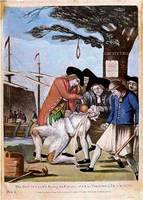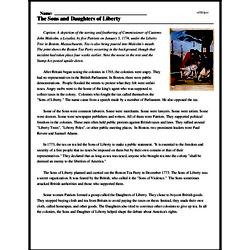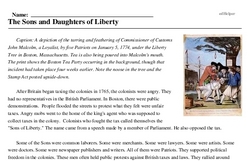The Sons and Daughters of Liberty
Caption: A depiction of the tarring and feathering of Commissioner of Customs John Malcolm, a Loyalist, by five Patriots on January 5, 1774, under the Liberty Tree in Boston, Massachusetts. Tea is also being poured into Malcolm's mouth. The print shows the Boston Tea Party occurring in the background, though that incident had taken place four weeks earlier. Note the noose in the tree and the Stamp Act posted upside-down.
After Britain began taxing the colonies in 1765, the colonists were angry. They had no representatives in the British Parliament. In Boston, there were public demonstrations. People flooded the streets to protest what they felt were unfair taxes. Angry mobs went to the home of the king's agent who was supposed to collect taxes in the colony. Colonists who fought the tax called themselves the "Sons of Liberty." The name came from a speech made by a member of Parliament. He also opposed the tax.
Some of the Sons were common laborers. Some were merchants. Some were lawyers. Some were artists. Some were doctors. Some were newspaper publishers and writers. All of them were Patriots. They supported political freedom in the colonies. These men often held public protests against British taxes and laws. They rallied around "Liberty Trees", "Liberty Poles", or other public meeting places. In Boston, two prominent leaders were Paul Revere and Samuel Adams.




